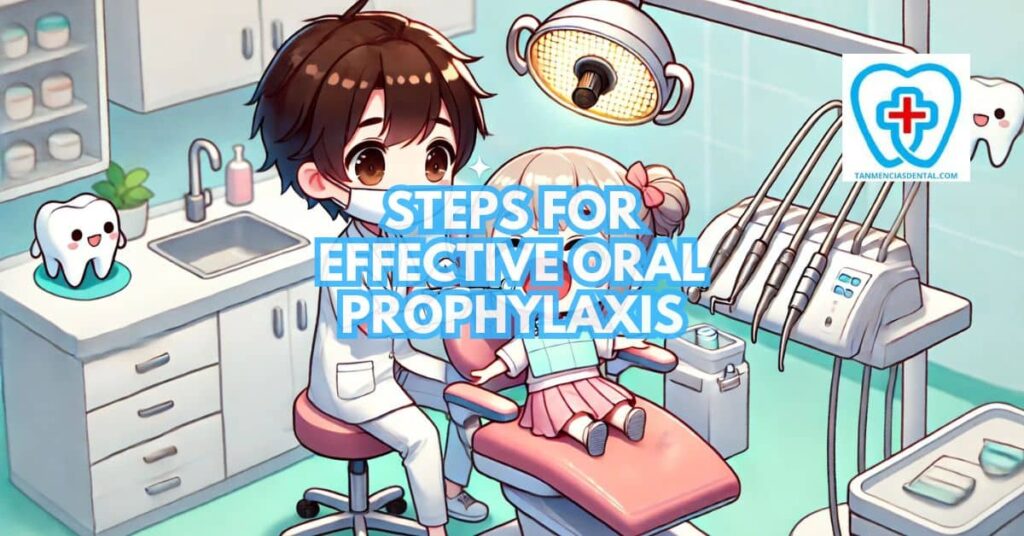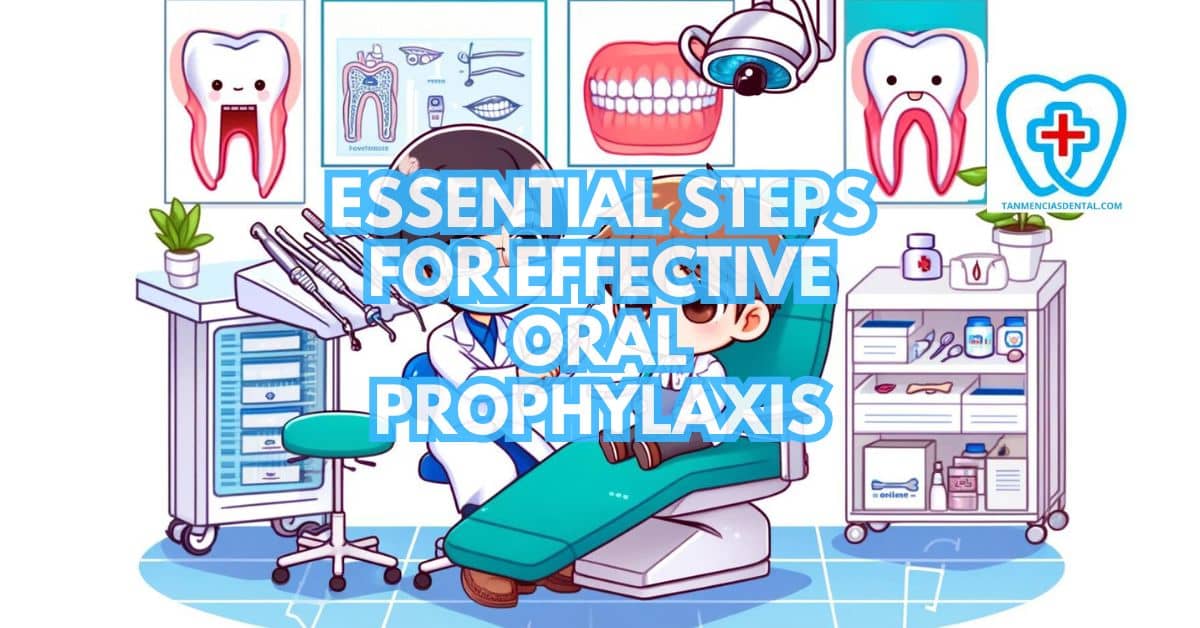Oral prophylaxis, also known as dental cleaning, is an important part of keeping your teeth and gums healthy.
It involves key steps to remove plaque and tartar that regular brushing and flossing can’t fully address.
Following these essential steps for effective oral prophylaxis helps prevent gum disease, tooth decay, and other common dental problems.
Routine cleanings don’t just improve oral health—they also contribute to a bright, attractive smile.
Plus, a healthy mouth supports overall wellness, showing how dental care impacts the entire body.
1. Brushing Basics: Mastering the Technique for Effective Dental Prophylaxis
For effective dental prophylaxis, mastering the technique of brushing is essential.
Using a soft-bristled toothbrush is crucial, as it helps avoid damage to the gums and enamel while effectively cleaning the teeth.
Each brushing session should last at least two minutes, ensuring that all tooth surfaces are thoroughly cleaned.
Angling the brush at 45 degrees against the gums allows the bristles to reach and remove the plaque that accumulates along the gumline.
This technique is vital in preventing the buildup of tartar, which is a primary cause of tooth decay and gum disease.
Regular visits to a dentist or dental hygienist can provide further guidance on proper brushing techniques and the use of oral prophylaxis instruments.
Together, these practices help maintain good oral health, keeping your teeth and gums healthy and strong.
🦷 Can Braces Cause Tooth Loss? Debunking Common Myths
2. Regularly Replace Your Toothbrush for Better Cleaning
Replacing your toothbrush regularly is important for maintaining good oral health and preventing dental disease.
Over time, toothbrush bristles wear down, making them less effective at removing plaque and food particles.
Worn bristles can leave behind buildup that may lead to stain formation and contribute to oral health issues.
Additionally, old toothbrushes can harbor bacteria, which can increase the risk of mouth infections or gum problems.
Dentists recommend replacing your toothbrush every three to four months, or sooner if you notice frayed, bent, or discolored bristles.
Look out for a loose or wobbly handle, which can also indicate it’s time for a new toothbrush.
To keep your toothbrush clean between uses, store it upright and allow it to air-dry, and remember—never share it with others.
🦷 How to Brush Teeth Without Water: Fresh Tips Anytime!
3. Flossing Fundamentals: Removing Plaque for Complete Oral Hygiene
Flossing plays a crucial role in oral hygiene by removing plaque and food particles from places your toothbrush can’t reach.
It is important to use a gentle sawing motion to bring the floss between the teeth without snapping it, which can harm delicate gum tissue.
Wrapping the floss around each tooth in a “C” shape allows for a thorough cleaning under the gumline.
Regular flossing helps to prevent gum disease and cavities by disrupting the colonies of bacteria that form along the gumline and between teeth.
For the best protection against oral health problems, this should be done every day.
🦷 Best Mouthwash for Tartar: Effective Dental Solutions
4. Fluoride Power: Your Ally Against Decay in Dental Health
Fluoride is a natural mineral essential to dental health.
It is known for its ability to fight tooth decay and strengthen tooth enamel.
Available in toothpaste, mouth rinses, and sometimes in community water supplies, fluoride is accessible for daily use.
Applying fluoride topically is an effective strategy to reverse the early signs of tooth decay and counteract the mineral loss caused by oral bacteria.
The regular application of fluoride-rich dental products enhances the resistance of tooth structures against decay and fosters the process of remineralization.
This prophylaxis treatment is especially beneficial for those at high risk of dental decay, offering a vital defense against cavity-causing bacteria.
Including simple oral prophylaxis in your daily routine, such as fluoride application, can help prevent the progression of periodontal disease.
Fluoride acts not just as a preventive measure but also as a treatment, enhancing dental health and maintaining long-term oral hygiene.
🦷 Teeth Cleaning in Marikina: Keep Your Smile Healthy

5. Diet and Oral Health: Food Choices Impacting Your Smile
Diet plays a significant role in oral health, where some foods can promote dental health while others can cause harm.
Foods high in sugars and acids can attack the tooth enamel, leading to cavities and decay.
Conversely, crunchy fruits and vegetables like apples and carrots help clean teeth naturally and stimulate the gums.
Calcium-rich foods such as dairy products strengthen the teeth by replenishing mineral content that plaque acids can deplete.
By making informed dietary choices, individuals can reduce their risk of dental problems and contribute to their overall oral health.
🦷 The Importance of Associates in Modern Dental Care
6. Don’t Forget Your Tongue: Maintaining a Clean Tongue for Fresh Breath
Maintaining a clean tongue is crucial for preserving overall mouth freshness and significantly enhancing oral hygiene.
The tongue’s surface, rich with crevices and textures, often harbors bacteria and food particles that, if not removed, can lead to bad breath and other dental health issues.
Using a tongue scraper or the bristles of your toothbrush is an effective method for removing these deposits, promoting a cleaner oral cavity.
Incorporating this simple practice into your daily oral care routine can not only improve your sense of taste but also significantly reduce the bacterial load in your mouth.
Regular cleaning of the tongue is a straightforward step that helps maintain a healthier oral environment and prevents dental problems related to bacterial buildup.
Beyond just brushing and flossing, tongue cleaning should be considered a vital part of maintaining oral health.
Techniques such as scaling during professional cleanings can complement these efforts by addressing plaque and tartar that are difficult to remove at home, ensuring comprehensive care of the oral cavity.
🦷 Can Gingivitis Be Deadly? Understanding the Risks
7. The Power of Regular Dental Checkups: Professional Cleanings and Proactive Oral Care
Regular dental checkups are crucial for maintaining oral health and identifying potential issues before they become severe.
During these visits, dental professionals can perform cleanings that remove plaque and tartar buildup that regular brushing and flossing can’t manage.
They also assess the health of your gums, perform oral cancer screenings, and can offer treatments and advice tailored to each individual’s needs.
These appointments allow dentists to track changes in dental health over time, ensuring that any emerging problems are addressed promptly.
Frequent dental checkups are essential for preventative oral care and long-term dental problems.
🦷 Can Gum Infections Be Fatal? The Consequences of Neglect
8. Oral Health and Gum Disease: The Connection Between Poor Oral Hygiene
Poor oral hygiene is directly linked to the development of gum disease, a condition that can lead to significant dental and health issues if left unchecked.
Symptoms of gum disease include redness, swelling, and bleeding of the gums, often caused by plaque buildup along and under the gum line.
Regular brushing, flossing, and professional cleanings are necessary to remove this plaque and prevent the inflammation that leads to gum disease.
Advanced gum disease, or periodontitis, can lead to tooth loss and has been linked to other health issues such as heart disease and diabetes.
Maintaining good oral hygiene is not only critical for keeping your gums healthy but also for safeguarding your overall health.
🦷 Fast Toothache Relief in Marikina: Emergency Care Tips
9. Beyond Brushing: Additional Tools for a Comprehensive Oral Prophylaxis
To enhance your oral prophylaxis routine, incorporating additional tools can make a significant difference.
Devices such as water flossers and interdental brushes can access areas that are challenging for regular brushes and floss to reach.
Mouthwashes with therapeutic properties can help reduce oral bacteria and flush out debris.
Electric toothbrushes are also beneficial for their efficiency and effectiveness in plaque removal.
Integrating these tools into your daily oral care routine can lead to better oral health outcomes and a more thorough cleaning process.
🦷 Foods for Healthy Teeth: The Impact of Your Diet
10. Banishing Bad Breath: Addressing Halitosis for Confidence
Halitosis, or chronic bad breath, is often due to lingering bacteria in the mouth, which can be a source of embarrassment and anxiety.
Regular brushing and flossing are essential to remove the food particles and plaque that contribute to bad breath.
It is also important to stay hydrated, as a dry mouth provides a perfect environment for bacteria to thrive.
Using antibacterial mouthwashes can help neutralize odor-causing bacteria.
Addressing underlying dental issues and maintaining rigorous oral hygiene are keys to combating bad breath and boosting confidence.
🦷 Top Tips for Whiten Teeth After Braces: Get Your Smile Back!
11. Making Oral Hygiene a Habit: Brushing, Flossing, and the Keys to Long-Term Success
Consistency is key when it comes to maintaining optimal oral health.
Establishing a routine that includes brushing twice a day and flossing daily is fundamental.
Setting specific times for these practices, such as brushing every morning and night, helps integrate them into your daily life.
Encouragement from family members can also play a role in maintaining these habits, especially for children.
By making oral hygiene a regular part of your day, you ensure the long-term health of your teeth and gums.
🦷 Tan-Mencias Dental Clinic in Marikina City
👨⚕️ Conclusion
Effective oral prophylaxis extends far beyond just keeping your teeth clean; it’s an essential part of maintaining your overall health.
Regular dental care prevents the progression of gum disease and decreases the likelihood of developing other serious health conditions linked to oral health, such as cardiovascular disease and diabetes.
Investing time in your oral health can lead to a lifetime of benefits, including a healthier smile and reduced medical expenses.
Remember, taking proactive steps in dental hygiene contributes significantly to a better quality of life.
Your commitment to maintaining effective oral prophylaxis is a commitment to your overall well-being.
😊 Self-Promotion
Visit us at Tan-Mencias Dental Clinic in Parang, Marikina City, where your smile is our top priority!
Our team is dedicated to providing you with the personalized, gentle care that you deserve.
For any questions or to schedule an appointment, feel free to call us at 9171451074, send us a message through our Facebook page, or reach out via the contact form on our website.
We’re here to assist you with all your dental needs and ensure a positive and comfortable experience.
Let us help you achieve and maintain a bright, healthy smile!

